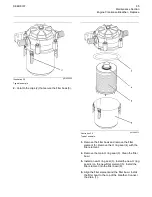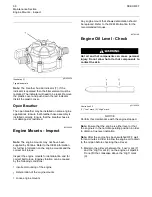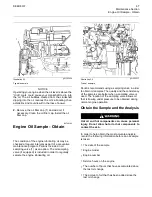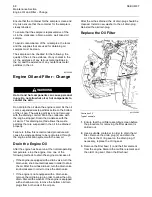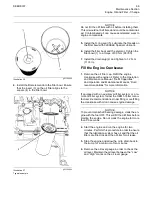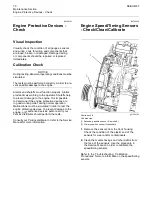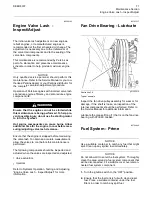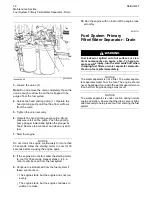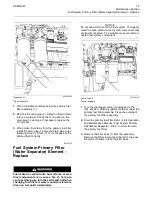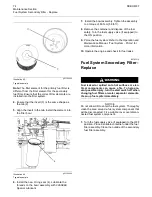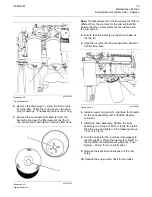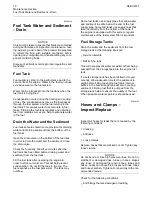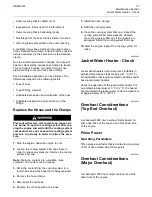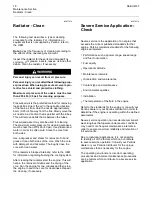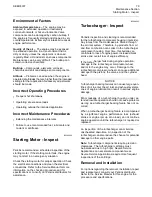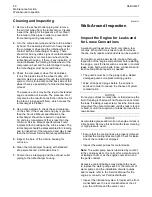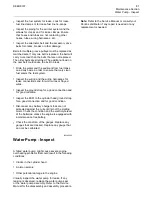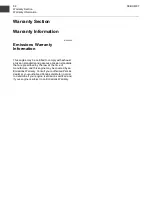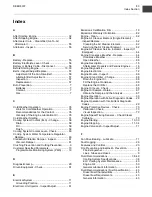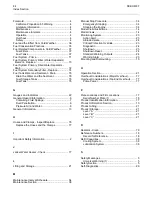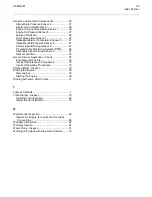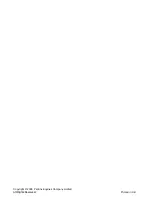
SEBU8337
79
Maintenance Section
Starting Motor - Inspect
Environmental Factors
Ambient temperatures –
The engine may be
exposed to extended operation in extremely
cold environments or hot environments. Valve
components can be damaged by carbon buildup if
the engine is frequently started and stopped in very
cold temperatures. Extremely hot intake air reduces
engine performance.
Quality of the air –
The engine may be exposed
to extended operation in an environment that is
dirty or dusty, unless the equipment is cleaned
regularly. Mud, dirt and dust can encase components.
Maintenance can be very dif
fi
cult. The buildup can
contain corrosive chemicals.
Buildup –
Compounds, elements, corrosive
chemicals and salt can damage some components.
Altitude –
Problems can arise when the engine is
operated at altitudes that are higher than the intended
settings for that application. Necessary adjustments
should be made.
Incorrect Operating Procedures
•
Frequent hot shutdowns
•
Operating at excessive loads
•
Operating outside the intended application
Incorrect Maintenance Procedures
•
Extending the maintenance intervals
•
Failure to use recommended fuel, lubricants and
coolant or antifreeze
i02568202
Starting Motor - Inspect
Perkins recommends a scheduled inspection of the
starting motor. If the starting motor fails, the engine
may not start in an emergency situation.
Check the starting motor for proper operation. Check
the electrical connections and clean the electrical
connections. Refer to the Service Manual for more
information on the checking procedure and for
speci
fi
cations or consult your Perkins distributors for
assistance.
i02568203
Turbocharger - Inspect
Periodic inspection and cleaning is recommended
for the turbocharger compressor housing (inlet side).
Any fumes from the crankcase are
fi
ltered through
the air inlet system. Therefore, by-products from oil
and from combustion can collect in the turbocharger
compressor housing. Over time, this buildup can
contribute to loss of engine power, increased black
smoke and overall loss of engine ef
fi
ciency.
If the turbocharger fails during engine operation,
damage to the turbocharger compressor wheel
and/or to the engine may occur. Damage to the
turbocharger compressor wheel can cause additional
damage to the pistons, the valves, and the cylinder
head.
NOTICE
Turbocharger bearing failures can cause large quan-
tities of oil to enter the air inlet and exhaust systems.
Loss of engine lubricant can result in serious engine
damage.
Minor leakage of a turbocharger housing under ex-
tended low idle operation should not cause problems
as long as a turbocharger bearing failure has not oc-
curred.
When a turbocharger bearing failure is accompanied
by a signi
fi
cant engine performance loss (exhaust
smoke or engine rpm up at no load), do not continue
engine operation until the turbocharger is repaired or
replaced.
An inspection of the turbocharger can minimize
unscheduled downtime. An inspection of the
turbocharger can also reduce the chance for potential
damage to other engine parts.
Note:
Turbocharger components require precision
clearances. The turbocharger cartridge must
be balanced due to high rpm. Severe Service
Applications can accelerate component wear.
Severe Service Applications require more frequent
inspections of the cartridge.
Removal and Installation
For options regarding the removal, installation, repair
and replacement, consult your Perkins distributor.
Refer to the Service Manual for this engine for the
procedure and speci
fi
cations.

